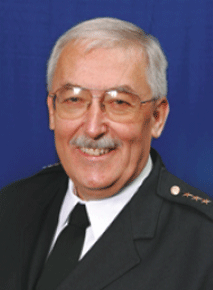
Over 116 years ago, a group of police chiefs realized that to be successful and to make sure that services were delivered professionally by their departments, they needed to work with other law enforcement executives. It was necessary for them to develop a forum where they could exchange information, communicate their successes and challenges, and develop professional executive training. Through their efforts, the IACP was born.
Even then, they realized that criminals were often on the move and that law enforcement agencies could no longer confine their efforts to a single jurisdiction, a single county, a single state, or even a single nation.
Through the efforts of these visionaries and their successors, the IACP has played a leading role over the years in ensuring that law enforcement agencies around the globe have kept pace with advances in forensic science, communications, and technology and remain prepared to combat crime effectively in today’s highly mobile and fast-paced environment.
But it is clear that successfully confronting the challenges posed by transnational criminal and terrorist organizations requires that the international law enforcement community establish and maintain effective working relationships that allow us to pool our information and our resources. It is also clear that the IACP must continue to play a leading role in fostering the growth and sustaining the strength of these critical relationships.
The IACP is strongly committed to working with all law enforcement professionals as we seek out opportunities to integrate and coordinate our efforts locally, nationally, and internationally to create a truly united front in the fight against all types of crime.
It is for this reason that the I in IACP has never been more important, and it is to the IACP that we look—to provide the leadership, the guidance, and the forum to accomplish our latest mission and defeat this menace. The IACP is leading the way for law enforcement leaders around the world as we proactively seek out opportunities to integrate and coordinate our efforts—locally, nationally, and internationally—to create a truly united front in the fight against crime and terrorism.
It is because of the central role that the IACP plays in fostering these critical relationships that I am so pleased with the continuing growth and strength of the IACP’s international program. Led by the association’s international vice president, Mohamed Abdulaziz Al-Nassr, the IACP Division of International Policing continues to grow; it now represents IACP members in 105 countries worldwide.
To assist our international membership, the IACP maintains seven world regional offices, in Ottawa, Canada; Bridgetown, Barbados; Brasilia, Brazil; London, England; Doha, Qatar; Kigali, Rwanda; and Delhi, India.
In addition to maintaining our world regional offices, the IACP continues to provide police executives around the world with the opportunity to come together and learn from one another at various regional training conferences. Already this year, the IACP has hosted its 10th Asia/Pacific Executive Policing Conference in Taipei, Taiwan, and its 26th IACP European Executive Policing Conference in Tallinn, Estonia. Both of these conferences were well attended, and we were honored to be joined by President Ma Ying-jeou of Taiwan and President Toomas Ilves of Estonia.
The IACP has also continued to raise our international profile by sending delegations to international policing conferences such as the annual conference of the British Association of Chief Police Officers, the Association of Caribbean Commissioners of Police, and Interpol. In addition, leaders of law enforcement agencies from France, Afghanistan, Albania, Iraq, Bangladesh, and South Africa, to name just a few, have visited IACP headquarters to discuss mutual areas of concern and to be briefed on the IACP’s programs and services. Through exchanges of this nature, the IACP hopes to establish and foster cooperative relationships with other law enforcement associations and agencies throughout the world.
Another innovative way the IACP is reaching out to international partners is through the IACP Foundation’s Global Enrichment Program (GEP), the first Foundation program dedicated solely to the needs of police executives from the international community. Through the GEP, the Foundation will defray the full cost of a two-year association membership for approximately 30 command-level police officials from nations that are either underrepresented or not represented at all in the membership rosters of the IACP.
The IACP has also established an International Fellowship Program for the International Policing Division that is designed to maximize each fellow’s exposure to national police executives and law enforcement organizations worldwide. The benefits of the program are twofold. First, the IACP advances its objective of enhancing the quality of law enforcement around the world through the exchange of information on police leadership and management; in addition, the fellows return to their agencies with greatly expanded skills in the areas of international liaison, policy, long-range planning, and program implementation as well as with greatly enhanced leadership and managerial skills.
Clearly, the IACP has made great strides in fostering international law enforcement cooperation over the years, through establishing and maintaining our world regional offices, conducting international executive policing seminars, and expanding the use of interpretation and translation services at the annual conference and on the IACP Web site.
It is my belief that the strength of the IACP’s international program is a reflection of the leading role that the IACP has played, and must continue to play, in bringing the world’s law enforcement agencies together as we strive to combat our common foes and protect our communities from harm.
It is also my belief that the strength of our international program is a validation of the vision and the wisdom of the IACP’s founders, who realized that only by working together, locally, nationally, and internationally, can we hope to prevail. ■


